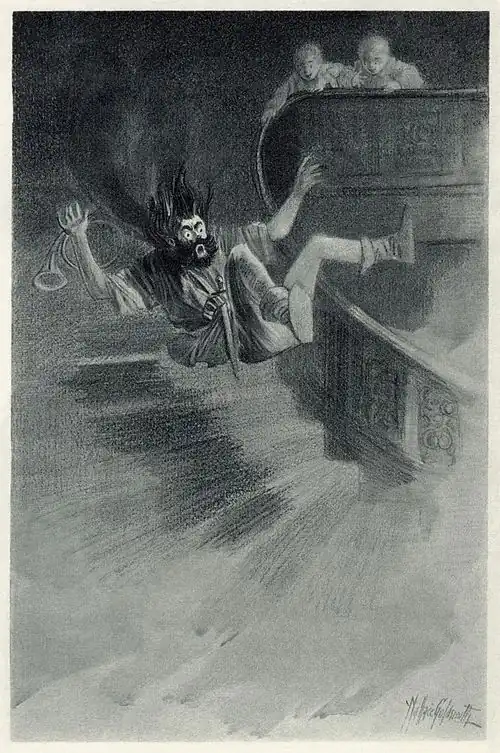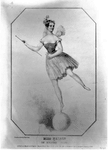Portal:Speculative fiction
 Speculative Fiction Portal logo
Speculative fiction is an umbrella phrase encompassing the more fantastical fiction genres, specifically science fiction, fantasy, horror, supernatural fiction, superhero fiction, utopian and dystopian fiction, apocalyptic and post-apocalyptic fiction, and alternate history in literature as well as related static, motion, and virtual arts. It has been around since humans began to speak. The earliest forms of speculative fiction were likely mythological tales told around the campfire. Speculative fiction deals with the "What if?" scenarios imagined by dreamers and thinkers worldwide. Journeys to other worlds through the vast reaches of distant space; magical quests to free worlds enslaved by terrible beings; malevolent supernatural powers seeking to increase their spheres of influence across multiple dimensions and times; all of these fall into the realm of speculative fiction. Speculative fiction as a category ranges from ancient works to cutting edge, paradigm-changing, and neotraditional works of the 21st century. It can be recognized in works whose authors' intentions or the social contexts of the versions of stories they portrayed is now known. For example, Ancient Greek dramatists such as Euripides, whose play Medea (play) seemed to have offended Athenian audiences when he fictionally speculated that shamaness Medea killed her own children instead of their being killed by other Corinthians after her departure. The play Hippolytus, narratively introduced by Aphrodite, is suspected to have displeased contemporary audiences of the day because it portrayed Phaedra as too lusty. In historiography, what is now called speculative fiction has previously been termed "historical invention", "historical fiction," and other similar names. It is extensively noted in the literary criticism of the works of William Shakespeare when he co-locates Athenian Duke Theseus and Amazonian Queen Hippolyta, English fairy Puck, and Roman god Cupid all together in the fairyland of its Merovingian Germanic sovereign Oberon in A Midsummer Night's Dream. In mythography it has been termed "mythopoesis" or mythopoeia, "fictional speculation", the creative design and generation of lore, regarding such works as J. R. R. Tolkien's The Lord of the Rings. Such supernatural, alternate history, and sexuality themes continue in works produced within the modern speculative fiction genre. Jump to a specific section belowSelected profileSamuel Langhorne Clemens (November 30, 1835 – April 21, 1910), known by the pen name Mark Twain, was an American writer, humorist, entrepreneur, publisher, and lecturer. He was praised as the "greatest humorist the United States has produced", and William Faulkner called him "the father of American literature". His novels include The Adventures of Tom Sawyer (1876) and its sequel, Adventures of Huckleberry Finn (1884), the latter of which has often been called the "Great American Novel". Twain also wrote A Connecticut Yankee in King Arthur's Court (1889) and Pudd'nhead Wilson (1894), and co-wrote The Gilded Age: A Tale of Today (1873) with Charles Dudley Warner. Twain was raised in Hannibal, Missouri, which later provided the setting for Tom Sawyer and Huckleberry Finn. He served an apprenticeship with a printer and then worked as a typesetter, contributing articles to the newspaper of his older brother Orion Clemens. Twain later became a riverboat pilot on the Mississippi River before heading west to join Orion in Nevada. He referred humorously to his lack of success at mining, turning to journalism for the Virginia City Territorial Enterprise. His humorous story "The Celebrated Jumping Frog of Calaveras County" was published in 1865, based on a story that he heard at Angels Hotel in Angels Camp, California, where he had spent some time as a miner. The short story brought international attention and was even translated into French. His wit and satire, in prose and in speech, earned praise from critics and peers, and Twain was a friend to presidents, artists, industrialists, and European royalty. Although initially an ardent American imperialist who spoke out strongly in favor of American interests in the Hawaiian Islands, he later became vice president of the American Anti-Imperialist League from 1901 until his death in 1910, coming out strongly against the Philippine-American War. (Full article...)Selected workStar Trek III: The Search for Spock is a 1984 American science fiction film, written and produced by Harve Bennett, directed by Leonard Nimoy, and based on the television series Star Trek. It is the third film in the Star Trek franchise and is the second part of a three-film story arc that begins with Star Trek II: The Wrath of Khan (1982) and concludes with Star Trek IV: The Voyage Home (1986). After the death of Spock (Nimoy), the crew of the USS Enterprise returns to Earth. When James T. Kirk (William Shatner) learns that Spock's spirit, or katra, is held in the mind of Dr. Leonard "Bones" McCoy (DeForest Kelley), Kirk and company steal the decommissioned USS Enterprise to return Spock's body to his homeworld. The crew must also contend with hostile Klingons, led by Kruge (Christopher Lloyd), who are bent on stealing the secrets of the powerful terraforming device, Genesis.
Paramount Pictures commissioned the film after the positive critical and commercial reaction to The Wrath of Khan. Nimoy directed this film, becoming the first Star Trek cast member to do so. Producer Harve Bennett wrote the script, starting from the end and working back, and intended the destruction of the Enterprise to be a shocking development. (Full article...) Selected quote
—Brian Aldiss (b.1925), Billion Year Spree: The True History of Science Fiction (1973). Selected picture "He met with a severe fall" from Wallace Goldsmith's illustrations to Oscar Wilde's The Canterville Ghost. A scene from "The Canterville Ghost", Oscar Wilde's first published story, which is about an American family that moves into a haunted house in England. However, instead of being frightened of the eponymous ghost, they turn the tables and prank him, such as in this scene, where the twin boys have set up a butter-slide, causing the ghost to slip down the staircase. The story satirises both the unrefined tastes of Americans and the determination of the British to guard their traditions. (POTD) Did you know...
Upcoming conventionsOctober:
November:
Dates can usually be found on the article page. See also these convention lists: anime, comic book, furry, gaming, multigenre, and science fiction. Selected articleThe Nebula Award for Best Novel is given each year by the Science Fiction and Fantasy Writers Association (SFWA) for science fiction or fantasy novels. A work of fiction is considered a novel by the organization if it is 40,000 words or longer; awards are also given out for pieces of shorter lengths, in the categories of short story, novelette, and novella. To be eligible for Nebula Award consideration, a novel must have been published in English in the United States. Works published in English elsewhere in the world are also eligible, provided they are released on either a website or in an electronic edition. The Award has been given annually since 1966. Novels which were expanded forms of previously published stories are eligible, and novellas published individually can be considered as novels if the author requests it. The award has been described as one of "the most important of the American science fiction awards" and "the science-fiction and fantasy equivalent" of the Emmy Awards.
Nebula Award nominees and winners are chosen by members of SFWA, though the authors nominated do not need to be members. Works are nominated each year by members in a period around December 15 through January 31, and the six works that receive the most nominations then form the final ballot, with additional nominees possible in the case of ties. Soon after, members are given a month to vote on the ballot, and the final results are presented at the Nebula Awards ceremony in May. Authors are not permitted to nominate their own works, and ties in the final vote are broken, if possible, by the number of nominations the works received. (Full article...)
On this day...Births
Deaths
Possible futuresPossible events in the future as suggested by science fiction:
Things you can do...Here are ideas for how you can help improve the coverage of speculative fiction topics on Wikipedia: Join a WikiProject or task force:
Start a requested article:
Expand a stub:
Expand a new article:
Note: If no articles are shown below, please work on those found in the Archive. This list was generated from these rules. Questions and feedback are always welcome! The search is being run daily with the most recent ~14 days of results. Note: Some articles may not be relevant to this project. Rules | Match log | Results page (for watching) | Last updated: 2023-10-24 22:29 (UTC) Note: The list display can now be customized by each user. See List display personalization for details.
How to write a new article
Recognized contentFeatured articles are considered to be the best on Wikipedia, as determined by Wikipedia's editors, and Good articles are those which are considered to be of good quality but which are not yet featured article quality. If you see one that should be listed here, please add it or post on the talk page and let us know so we can add it for you. Speculative fiction topicsCreators: Artists (list) · Authors (by nationality) · Editors Fantasy
Creators: Artists · Authors Horror
Creators: Artists · Authors SubcategoriesCategory puzzle Select [►] to view subcategories
Speculative fiction Speculative fiction by nationality Speculative fiction franchises Speculative fiction genres Speculative fiction lists Speculative fiction by medium Speculative fiction by topic Speculative fiction characters Speculative fiction locations Speculative fiction artists Speculative fiction awards Speculative fiction сonventions Speculative fiction critics Dystopias Speculative fiction editors Speculative fiction publishers Speculative fiction translation Speculative fiction writers Speculative fiction writing circles Related portalsWikimediaThe following Wikimedia Foundation sister projects provide more on this subject:
Associated content
Science fiction The following Wikimedia Foundation sister projects provide more on this subject:
Fantasy The following Wikimedia Foundation sister projects provide more on this subject:
Horror The following Wikimedia Foundation sister projects provide more on this subject:
Portal directoryDiscover Wikipedia using portals
|


